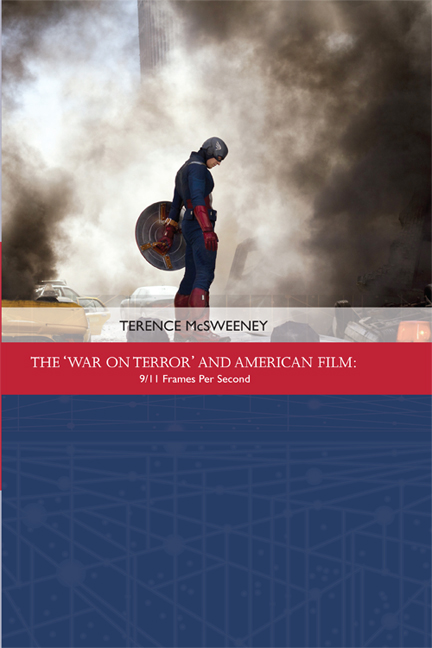Book contents
- Frontmatter
- Contents
- List of Illustrations
- Acknowledgements
- Introduction
- 1 The Lives of Others: Vulnerability in Post-9/ 11 American Cinema
- 2 Boots on the Ground: The New Millennial Combat Film as Cultural Artefact
- 3 ‘Masters of our own Security’: Redemption through Violence in the Post-9/ 11 Action Genre
- 4 Turning to the Dark Side: Challenging American Mythology in the Superhero Genre
- 5 Remaking 9/11: Imagining the Unimaginable in the Alien- invasion Film
- 6 Decade of the Dead: Zombie Films as Allegory of National Trauma
- 7 The Rise and Fall of Empires: The ‘War on Terror’ as Allegorical Moment in Historical Film
- Conclusion
- Bibliography
- Select Filmography
- Index
5 - Remaking 9/11: Imagining the Unimaginable in the Alien- invasion Film
Published online by Cambridge University Press: 05 August 2016
- Frontmatter
- Contents
- List of Illustrations
- Acknowledgements
- Introduction
- 1 The Lives of Others: Vulnerability in Post-9/ 11 American Cinema
- 2 Boots on the Ground: The New Millennial Combat Film as Cultural Artefact
- 3 ‘Masters of our own Security’: Redemption through Violence in the Post-9/ 11 Action Genre
- 4 Turning to the Dark Side: Challenging American Mythology in the Superhero Genre
- 5 Remaking 9/11: Imagining the Unimaginable in the Alien- invasion Film
- 6 Decade of the Dead: Zombie Films as Allegory of National Trauma
- 7 The Rise and Fall of Empires: The ‘War on Terror’ as Allegorical Moment in Historical Film
- Conclusion
- Bibliography
- Select Filmography
- Index
Summary
Robbie: What is it? Is it terrorists? Ray: These came from someplace else. Robbie: What do you mean? Like, Europe? Ray: No, Robbie, not like Europe!
War of the Worlds (2005)If I thought we were safe from attack, I would be thinking differently. But I see a gathering threat.
George W. Bush (Anonymous 2003a)The New York events have radicalized the relation of images to reality, in the same way as they have radicalized the global situation. While before we dealt with an unbroken abundance of banal images and an uninterrupted flow of spurious events, the terrorist attack in New York has resurrected both the image and the event … But does reality really prevail over fiction? If it seems so, it is because reality has absorbed the energy of fiction, and become fiction itself. One could almost say that reality is jealous of fiction, that the real is jealous of the image … It is as if they duel, to find which is the most unimaginable.
Jean Baudrillard, The Spirit of TerrorismIn the preceding chapters we have seen how American cinema has been reluctant to represent the terrorist attacks on September 11th 2001 directly on the screen and how, when the events have been portrayed, it has been in a very particular fashion, thematically and aesthetically. Dramatisations of the two hijacked airliners striking the World Trade Center and the extent of the death and destruction experienced on 9/11 have remained a persistent taboo in American film. If depicted at all, the moments of collision themselves have been portrayed through the use of a black screen and original sound recordings of the real-life transmission (see Zero Dark Thirty and Fahrenheit 9/11) or authentic news footage recorded on the day (see United 93 and World Trade Center). This erasure is almost certainly an expression of the prevailing understanding that 9/11 was such a traumatic event that it could never be accurately portrayed, very much akin to the belief that it is impossible to truthfully represent the inconceivable trauma of those who experienced the Holocaust.
- Type
- Chapter
- Information
- The 'War on Terror' and American Film9/11 Frames Per Second, pp. 135 - 156Publisher: Edinburgh University PressPrint publication year: 2014



